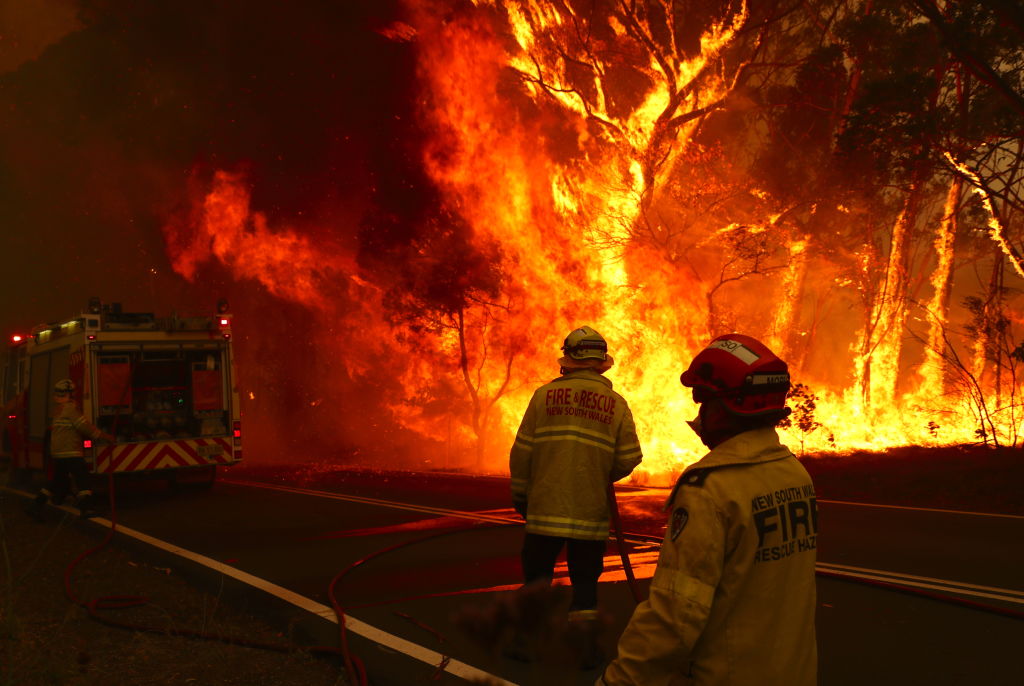New South Wales declares a 7-day state of emergency as Australia's deadly bushfires rage

(CNN)The
Australian state of New South Wales has declared a state of emergency
and could begin forced evacuations from fire-stricken areas, as
emergency crews battle deadly blazes and brace for a dangerous weekend ahead.
State
Premier Gladys Berejiklian said Thursday that the emergency declaration
would come into effect Friday morning as weather conditions are
expected to deteriorate significantly on Saturday, raising the fire
danger even further.
This
is the third time NSW has declared a state of emergency in as many
months -- the last two times, in November and December, were also for
seven days, and granted extraordinary powers to the Rural Fire Service.
Berejiklian
said residents could also be subject to forced evacuations, road
closures and any other means necessary to keep people safe.
"We
want to make sure we are taking every single precaution to be prepared
for what could be a horrible day on Saturday," she said.
Thousands of people were already fleeing the state's south coast on Thursday, with the Rural Fire Service setting up a "tourist leave zone" from
the town of Batemans Bay down to the Victoria border. All visitors were
urged to evacuate before Saturday, when temperatures above 40 degrees
Celsius (104 degrees Fahrenheit), dry conditions and ferocious winds are
expected to heighten the risk of further blazes.
"These will be dangerous conditions," the fire service warned. "Do not be in this area on Saturday."
Thousands are evacuating from the coast
Similar hot, windy weather on Tuesday led to massive fires spreading out of control. Seven people died from the fires within 24 hours.
Conditions improved slightly on Thursday -- creating a small window of
opportunity for people to evacuate before the situation worsens again
Saturday.
Tens of thousands of
people are estimated to be in the south coast region, home to seaside
towns that swell in population during summer.
Residents
on Thursday were heeding the warning. Hundreds if not thousands of cars
were backed up in small towns south of Nowra, on the southern coast,
according to police. Roads away from the tourist area were packed with
long lines of cars waiting to leave, and one major road heading south
beyond Nowra was closed due to a fire that jumped the highway.
Some people had been waiting in line for hours and were getting frustrated, with little indication of when the road will open.
Nowra
resident Trevor Garland was one of those trying to head south -- his
16-year-old daughter was stranded in the NSW town Sussex Inlet, where
she was visiting a friend.
"The big picture is one road in, one road out," he told CNN on Thursday. "I'm going to wait here all night if I have to."
Rob
O'Neill had been waiting for six hours at the roadblock. He was also
trying to head south to find his children, aged 4 and 5, who are staying
with their grandparents. He said he hadn't been able to contact them
since Monday, and the fire line had moved as close as several hundred
feet from the grandparents' house.
"We
want to get them out before Saturday comes. Predictions are pretty bad
for Saturday," he said. "Not knowing is pretty scary -- we don't know
how they're going."
Authorities are
working to clear the backlog and reach the cut-off areas. In
neighboring Victoria state, there are 24 such isolated communities,
according to Premier Daniel Andrews -- including the town of Mallacoota,
where thousands of residents fled their homes to seek refuge at the beach on Monday.
A
navy vessel will make multiple trips in Mallacoota on Friday to
transport up to 800 residents and tourists to an unspecified safe
location, Andrews said Thursday. Air evacuations could also happen once
dense smoke begins to move away from the area.
Scenes
from the ground show military personnel in trucks and rubber dinghies,
rescuing stranded residents and shrouded in yellow haze.
Prime
Minister Scott Morrison said Thursday that the federal government was
also sending resources when requested by states, including additional
funding and military support from the Australian Defence Force. He
warned that many areas were difficult for emergency personnel to safely
access, and urged residents to remain calm and patient.





No comments